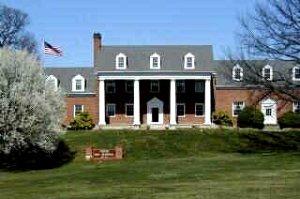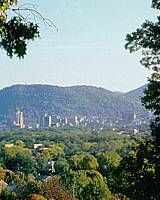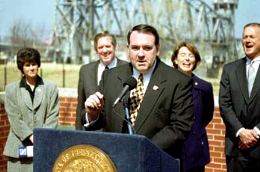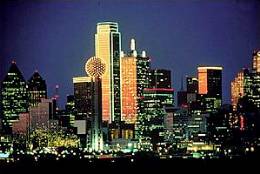|
by JACK LYNE, Site Selection Executive Editor
of Interactive Publishing
VINTON, Va. – Cardinal Glass Industries, which couldn't win one Virginia community's approval for a plant in 1998, is coming back to the Old Dominion State with a $24-million production facility in Vinton, Va. The Eden Prairie, Minn.-based company's plant in Roanoke County may employ as many as 300 workers.
Virginia beat out two other Southeast states, Georgia and North Carolina, for the project, Cardinal Glass officials said in announcing the decision. As in almost all site selections, labor and local support had a lot to do with the company's choice, explained President and Chief Executive Officer Roger O'Shaughnessy.
"It is the sound work ethic of the region and the strong support of state, county and town officials that has brought us to the Roanoke Valley," O'Shaugnessy said.
But perhaps an even more decisive factor that brought the project to the Northern Virginia area was another Minnesota-based company: Integrity Windows, headquartered in Warroad, Minn. Cardinal Glass is a major supplier to Integrity, which in February announced that it was building a $32-million, 350-employee plant in the Valley Gateway Business Park in Roanoke County.
"Integrity told us that they were going to build a new plant in the Roanoke Valley, and they asked us to also bear in mind the area as a location from which to supply them," O'Shaughnessy said. Locating the Cardinal Glass insulating-glass plant in Vinton will also position it closer to other customers as well, he added.
The facility is being designed to allow for further growth. Cardinal Glass plans within five years to add a 102,000-sq.-ft. (9,180-sq.-m.) expansion that will be able to accommodate another 100 workers, O'Shaughnessy said.
Company officials anticipate that the new manufacturing facility will be online in about a year. The plant will open with a staff of 70 and then expand, they explained.
The Vinton plant will fabricate sandwich-like insulated glass. Ironically that product's components will be produced in plants located in the two other finalist states that contended for the new Cardinal Glass project. The float glass will come from one of the company's existing production facilities in Mooresville, N.C., while the coated glass will come from a Cardinal Glass plant in Buford, Ga.
The Vinton plant will be the company's 18th manufacturing facility, all of them located in the U.S. The privately held company, which employs some 4,000 workers, also has two research labs in the Minneapolis-St. Paul metro.
|
O'Shaughnessy also praised the economic development efforts of local, regional and state officials, which he called "the best I've ever seen in 22 site selections."
It was a far reception different from the one Cardinal Glass earlier encountered in Virginia. The company in 1997 had announced that it intended to build a $75-million factory near Kernstown, some 177 miles (283 kilometers) southwest of Vinton. Cardinal Glass filed an application for an air-quality permit for the facility.
That expansion plan fell apart, though, in February of 1998. Some 800 Frederick County residents attended a public hearing on the plant permit, many voicing opposition to the project's air-quality impact. Within a few days, four of the seven county supervisors announced that they were opposed to the project.
Cardinal Glass soon after withdrew its permit application and abandoned plans for the Frederick County location. In 1999, the plant went instead to the North Carolina location in Mooresville.
State and local officials made Cardinal Glass feel more welcome this time around with an incentive package of more than $1.3 million. Of that total, $300,000 is a grant from the Virginia Governor's Opportunity Fund, while some $120,000 is in job-training funds from the state's Department of Workforce Services.
But the largest chunk of the incentive package - $890,000 - is coming from Vinton and Roanoke County. City-county subsidies include extensions and connections for utilities, improvements to road infrastructure and an economic development grant to cover project-related costs.
|
by JACK LYNE, Site Selection Executive Editor of Interactive Publishing
WYNNE, Ark. – Auto parts manufacturer Eakas Corp. has picked the Wynne, Ark., area for its first plant in the U.S. Southeast.
A subsidiary of Japan-based Sakae Riken Kogyo Company, Eakas has selected a 40-acre (16-hectare) site just south of Wynne, a city of some 8,700 residents that sits 48 miles (77 kilometers) west of Memphis, Tenn. The company will break ground in January on a 91,000-sq.-ft. (8,190-sq.-m.) plant that will ultimately employ at least 250 workers, Eakas President Tom Mori said while joining state and local officials in announcing the project.
Eakas' current U.S. operations are centered in Peru, Ill. The company's Illinois site houses a 257,000-sq.-ft. (23,130-sq.-m.) manufacturing plant and also serves as the subsidiary's headquarters.
Like its sister production operation in Illinois, Eakas' Arkansas plant will make plastic auto components, with particular emphasis on rearview mirrors and door handles. At full capacity, the Wynne operation will be capable of producing 320,000
|
"The good news just keeps coming to the Arkansas Delta," Gov. Mike Huckabee (R) said in Wynne.
Japan's Denso Corp., the world's third-largest auto-parts maker, in July announced that it was bringing a $35-million, 500-worker plant to Osceola, another small Arkansas Delta city some 66 miles (106 kilometers) east of Wynne. (For more, see the Aug. 4, 2003, Blockbuster Deal).
Auto-Industry Interest
"The automotive industry and auto parts industry are in the midst of a globalizing process, and presently American automotive builders are expanding towards the Mid-South," said Sakae Riken Kogyo President Yoshihisa Okano.
The company's final short list boiled down to Wynne and Brownsville, Tenn. The Tennessee site is located 55 miles (88 kilometers) northeast of Memphis, and 109 miles (174 kilometers) east of the Arkansas location that Eakas selected.
Eakas officials didn't publicly discuss the particulars of the decision, which was made by parent firm Sakae Riken Kogyo, according to state officials. Jim Pickens, director of the Arkansas Economic Development Department, surmised that the choice was made "because the Wynne area met their geographical and work-force requirements."
"This is a good match for the company and for Wynne," said Bill Thomas, executive director of the Cross County Economic Development Corp.
The auto industry in recent months has found several good site selection matches in the area that spans both east Arkansas and the west Tennessee.
One very interested heavyweight was Toyota Motor Corporation. The automaker gave a long, hard look at a Marion, Ark., site before deciding on San Antonio for its 2,000-employee, $800-million pickup assembly plant. (Look for an extensive rundown in the January 2004 Site Selection on "super sites" like the tract of more than 1,000-acres [400-hectares] that Arkansas put together to offer Toyota.)
In April, though, the area landed a major deal, when Toyota subsidiary Bodine Aluminum announced plans to build a 200-worker plant in Jackson, Tenn. (See the April 7 Project Watch.) That decision was followed soon by the Arkansas location choice by Denso, another Toyota subsidiary.
"We're proving how responsive and hospitable Arkansas cities are," Huckabee said.
The local area is also providing assistance, with much of it coming due to residents' aggressiveness about business recruiting. Thomas praised the local populace for the 1-percent sales tax for economic development that Cross County voters approved in 1999.
Eakas, which also has four plants in Japan and one in China, didn't disclose any of the automakers that its Arkansas operation will supply.
But the company already has a number of existing supplier relationships with major auto-industry players. Eakas' current clientele includes Honda Motor Co., Isuzu Motors, Nissan Motor Co. and Toyota.
Production at Eakas' Arkansas operation will go online in March of 2005, Mori said.
Industry Review in the January 2004 Site Selection.
|
New Broadband Unit's HQ
by JACK LYNE, Site Selection Executive Editor of Interactive Publishing
DALLAS and MUNICH – Take broadband; add broad-scale, burgeoning market; mix liberally with broad-ranging response.
That's the capsule summary for the strategy that German-based electronics giant Siemens AG has rolled out in creating a new business unit focused on broadband customer premises equipment (CPE).
Siemens is sowing the newly formed unit's first seeds by setting up four R&D centers that span three nations and two continents, company officials announced. Dallas will be the centerpiece of the four new operations, serving as the headquarters for the new organization, which has been dubbed Siemens Subscriber Networks (SSN).
SSN's three other centers will be located in Brussels, Belgium; San Jose, Calif.; and Zurich, Switzerland.
SSN will be a largely independent entity, officials with the Munich-based parent explained. Top management is composed of the same leaders who helmed Efficient Networks (EN), a key acquisition for Siemens several years ago. At the same time, though, SSN will be part of Siemens' Information and Communication Networks group.
That arrangement places SSN in an enviable position: a new-blood business with access to a blueblood's resources.
|
"By leveraging the established Siemens sales channel, we enjoy the best of both worlds," said SSN President Paul Reitmeier, who was also president of EN. "We are able to maintain the innovative spirit and drive of a start-up while having access to a well-developed, global sales organization."
That organization includes Siemens AG's 426,000 employees scattered over a whopping 190 countries. And the company already has in-place channels in 160 of those nations that are selling broadband CPE solutions.
"With this move we are addressing head-on the market's demand for innovative, broadband solutions that meet the needs of a diverse, global market," Reitmeier said of SSN's creation.
Siemens' move to aggressively go after the market for broadband consumer devices seems well-timed. Broadband is among the world's fastest-growing technological markets. The most new DSL lines in history were added in first-quarter 2003, according to the research firm Top Point Ltd. In the U.S., the number of broadband users grew by 43 percent to 18 million users in the 12-month period ending June 2003, research firm RHK Inc. found.
That the U.S. landed two of SSN's first four centers is no great surprise. The U.S. market is Siemens' largest, accounting for $21.5 billion of the company's $77.8 billion in worldwide sales in fiscal 2002.
SSN represents the new name for EN as well. EN already ranked as the world's largest provider of DSL CPE equipment when Siemens acquired it in early 2001 for $1.5 billion.
SSN's newly tapped headquarters location also marks the second time that Siemens has chosen the Dallas-Ft. Worth metro for a headquarters site. The area is already home to Siemens Dematic Postal Automation (SDPA), which designs and manufactures postal industry mail-sorting and image-recognition systems. SDPA is currently building a new headquarters and R&D facility for its 500 employees in Arlington. The 235,000-sq.-ft. (21,150-sq.-m.) in The Ballpark in Arlington is scheduled for completion in early 2004.
Dallas-Ft. Worth has proved to be a popular location for telecom players. Companies that have established metro-area headquarters or regional offices over the years include Alcatel Network Systems, CellStar, DSC Communications, Ericsson , GTE, Lucent Technologies, Motorola, Nokia, Northern Telecom, PrimeCo Personal Communications, Southwestern Bell Mobile Systems, Trott Communications Group and Uniden Corp. of America.
SSN hasn't announced specific sites in the four cities that have been named for the company's R&D centers. The company also hasn't yet made public any employment projections for any of those cities.
 PLEASE VISIT OUR SPONSOR • CLICK ABOVE
PLEASE VISIT OUR SPONSOR • CLICK ABOVE 
©2003 Conway Data, Inc. All rights reserved. Data is from many sources and is not warranted to be accurate or current.





